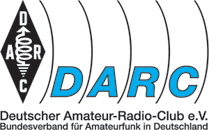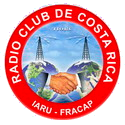
The Deutscher Amateur Radio Club e.V. (DARC) is a national non-profit organization for amateur radio enthusiasts in Germany. As of 1 January 2008, the organization had 35,773 members, approximately 60% of all licensed amateur radio operators in Germany. Key membership benefits of the organization include QSL bureau services, a monthly membership magazine called CQ DL, and the promotion and sponsorship of radio contests. DARC promotes amateur radio by organizing classes and technical support to help enthusiasts earn their amateur radio license. The DARC also represents the interests of German amateur radio operators and shortwave listeners before German and international telecommunications regulatory authorities. DARC is the national member society representing Germany in the International Amateur Radio Union.
The Radio Amateur Society of Thailand (RAST) is a national non-profit organization for amateur radio enthusiasts in Thailand. The organization is founded under the royal patronage of the King of Thailand, and qualifies as a charitable entity pursuant to a Thai Ministry of Finance declaration. The organization was founded on August 22, 1963 by a group of amateur radio operators who met at a restaurant in Bangkok. Among the first orders of business was to address official objections to the communications of radio amateurs in Thailand with amateur radio operators in other countries. The RAST represents the interests of Thai amateur radio operators and shortwave listeners before Thai and international telecommunications regulatory authorities. RAST is the national member society representing Thailand in the International Amateur Radio Union.
The Unión de Radioaficionados Españoles (URE) is a national non-profit organization for amateur radio enthusiasts in Spain. The organization has approximately 8,000 members, predominantly amateur radio operators in Spain. URE promotes amateur radio by sponsoring amateur radio operating awards and radio contests. The URE also represents the interests of Spanish amateur radio operators and shortwave listeners before Spanish and international telecommunications regulatory authorities. URE is the national member society representing Spain in the International Amateur Radio Union.
The Associazione Radioamatori Italiani is a national non-profit organization for amateur radio enthusiasts in Italy.
The Radio Club Argentino (RCA) is a national non-profit organization for amateur radio enthusiasts in Argentina. RCA was founded in Buenos Aires on October 21, 1921. Key membership benefits in the organization include the use of a QSL bureau for those amateur radio operators in regular contact with amateur radio operators in other countries, a group insurance policy, and a quarterly membership journal called Revista del Radio Club Argentino. The Radio Club Argentino represents the interests of Argentine amateur radio operators before Argentine and international regulatory authorities. It is also the national member society representing Argentina in the International Amateur Radio Union.
The Rede dos Emissores Portugueses (REP) is a national non-profit organization for amateur radio enthusiasts in Portugal. REP was founded in 1926 by Eugenio de Avillez P1AE, an early Portuguese radio experimenter. Key membership benefits of the REP include a QSL bureau for those amateur radio operators in regular communications with other amateur radio operators in foreign countries, and the sponsorship of amateur radio operating awards and radio contests. The REP represents the interests of Portuguese amateur radio operators before Portuguese and international regulatory authorities. REP is the national member society representing Portugal in the International Amateur Radio Union, which it joined in 1931.

The Radio Club de Chile (RCCH) is a national non-profit organization for amateur radio enthusiasts in Chile. Key membership benefits of RCCH include the sponsorship of amateur radio operating awards and radio contests, and a QSL bureau for those members who regularly communicate with amateur radio operators in other countries. RCCH represents the interests of Chilean amateur radio operators before Chilean and international telecommunications regulatory authorities. RCCH is the national member society representing Chile in the International Amateur Radio Union.
The Radio Club Venezolano (RCV) is a national non-profit organization for amateur radio enthusiasts in Venezuela. Key membership benefits of RCV include the sponsorship of amateur radio operating awards and radio contests, and a QSL bureau for those members who regularly communicate with amateur radio operators in other countries. RCV represents the interests of Venezuelan amateur radio operators before Venezuelan and international telecommunications regulatory authorities. RCV is the national member society representing Venezuela in the International Amateur Radio Union.
The Radio Club Uruguayo (RCU) is a national non-profit organization for amateur radio enthusiasts in Uruguay. RCU was founded on August 23, 1933. The RCU operates a QSL bureau for those amateur radio operators in regular contact with amateur radio operators in other countries. Radio Club Uruguayo represents the interests of amateur radio operators in Uruguay before national and international regulatory authorities. RCU is the national member society representing Uruguay in the International Amateur Radio Union.
The Radio Club Paraguayo (RCP) is a national non-profit organization for amateur radio enthusiasts in Paraguay. The RCP operates a QSL bureau for those amateur radio operators in regular contact with amateur radio operators in other countries, and supports amateur radio operating awards and radio contests. Radio Club Paraguayo represents the interests of Paraguayan amateur radio operators before national and international regulatory authorities. RCP is the national member society representing Paraguay in the International Amateur Radio Union.
The Radio Club Peruano (RCP) is a national non-profit organization for amateur radio enthusiasts in Peru. RCP was founded on December 6, 1930 and the first General Meeting of the organization was held in the halls of the Library of the Geographical Society in Lima, Peru in January, 1931. The RCP operates a QSL bureau for those amateur radio operators in regular contact with amateur radio operators in other countries, and supports amateur radio operating awards and radio contests. Radio Club Peruano represents the interests of Peruvian amateur radio operators before national and international regulatory authorities. RCP is the national member society representing Peru in the International Amateur Radio Union.
The Pakistan Amateur Radio Society (PARS) is a national non-profit organization for amateur radio enthusiasts in Pakistan. It operates a QSL bureau for those amateur radio operators in regular contact with amateur radio operators in other countries, and supports amateur radio operating awards and radio contests. It represents the interests of Pakistani amateur radio operators before national and international regulatory authorities. PARS is the national member society representing Pakistan in the International Amateur Radio Union.
The Club de Radioaficionados de Guatemala (CRAG) is a national non-profit organization for amateur radio enthusiasts in Guatemala. Key membership benefits of the CRAG include a QSL bureau for those amateur radio operators in regular communications with other amateur radio operators in foreign countries, and a network to support amateur radio emergency communications. CRAG represents the interests of Guatemalan amateur radio operators before Guatemalan and international regulatory authorities. CRAG is the national member society representing Guatemala in the International Amateur Radio Union.

The Club de Radioexperimentadores de Nicaragua (CREN) is a national non-profit organization for amateur radio enthusiasts in Nicaragua. Key membership benefits of the CREN include a QSL bureau for those amateur radio operators in regular communications with other amateur radio operators in foreign countries, and a network to support amateur radio emergency communications. CREN represents the interests of Nicaraguan amateur radio operators before Nicaraguan and international regulatory authorities. CREN is the national member society representing Nicaragua in the International Amateur Radio Union.

The Radio Club de Costa Rica (RCCR) is a national non-profit organization for amateur radio enthusiasts in Costa Rica. Key membership benefits of the RCCR include a QSL bureau for those amateur radio operators in regular communications with other amateur radio operators in foreign countries, and a network to support amateur radio emergency communications. RCCR represents the interests of Costa Rican amateur radio operators before Costa Rican and international regulatory authorities. RCCR is the national member society representing Costa Rica in the International Amateur Radio Union.

The Club de Radio Aficionados de El Salvador (CRAS) is a national non-profit organization for amateur radio enthusiasts in El Salvador. Key membership benefits of the CRAS include a QSL bureau for those amateur radio operators in regular communications with other amateur radio operators in foreign countries, and a network to support amateur radio emergency communications. CRAS represents the interests of El Salvadoran amateur radio operators before El Salvadoran and international regulatory authorities. CRAS is the national member society representing El Salvador in the International Amateur Radio Union.

The Liga Panameña de Radioaficionados (LPRA) is a national non-profit organization for amateur radio enthusiasts in Panama. Key membership benefits of the LPRA include a QSL bureau for those amateur radio operators in regular communications with other amateur radio operators in foreign countries, and a network to support amateur radio emergency communications. LPRA represents the interests of Panamanian amateur radio operators before Panamanian and international regulatory authorities. LPRA is the national member society representing Panama in the International Amateur Radio Union.
The Israel Amateur Radio Club (IARC) is a national non-profit organization for amateur radio enthusiasts in Israel. The organization uses IARC as its official international abbreviation, based on the English translation of the Hebrew name. IARC promotes amateur radio by sponsoring amateur radio operating awards and radio contests. The IARC operates a QSL bureau for those members who regularly communicate with amateur radio operators in other countries. The IARC represents the interests of Israeli amateur radio operators and shortwave listeners before Israeli and international telecommunications regulatory authorities. IARC is the national member society representing Israel in the International Amateur Radio Union.

The Unió de Radioaficionats Andorrans (URA) is a national non-profit organization for amateur radio enthusiasts in Andorra. URA operates a QSL bureau for those members who regularly communicate with amateur radio operators in other countries. URA represents the interests of Andorran amateur radio operators and shortwave listeners before Andorran and international telecommunications regulatory authorities. URA is the national member society representing Andorra in the International Amateur Radio Union.
The Aruba Amateur Radio Club (AARC) is a national non-profit organization for amateur radio enthusiasts in Aruba. AARC operates a QSL bureau for those members who regularly communicate with amateur radio operators in other countries. The organization operates amateur radio repeaters located at points of high elevation on Sero Yamanota that can be accessed from around the island, from Curaçao, and parts of Venezuela. AARC represents the interests of Aruban amateur radio operators before Aruban and international telecommunications regulatory authorities. AARC is the national member society representing Aruba in the International Amateur Radio Union.










